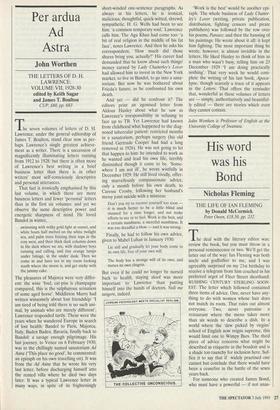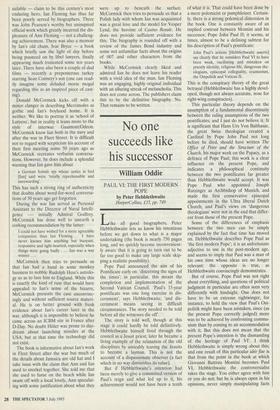His word was his Bond
Nicholas Fleming
THE LIFE OF IAN FLEMING by Donald McCormick Peter Owen, £18.50, pp. 232 he deal with the literary editor was: review the book, but you must throw in a personal reminiscence or two. We'll get the latter out of the way: Ian Fleming was both uncle and godfather to me, and I was agreeably surprised on my 21st birthday to receive a telegram from him couched in his preferred argot of Fleet Street shorthand: RUSHING CENTURY STERLING SOON- EST. The letter which followed contained three items of advice. One, never have any- thing to do with women whose hair does not match its roots. That rules out almost everyone. Two, never patronise a restaurant where the menu takes more than six words to describe a dish. In a world where the 'dew picked by virgins' school of English now reigns supreme, this would limit one to Wimpy Bars. The third piece of advice concerns what might be described as etiquette in the boudoir and is a shade too raunchy for inclusion here. Suf- fice it to say that if widely practised one cannot but conclude that there would have been a ceasefire in the battle of the sexes years back.
For someone who created James Bond, who must have a powerful — if not unas- sailable — claim to be this century's most enduring hero, Ian Fleming has thus far been poorly served by biographers. There was John Pearson's worthy but uninspired official work which greatly incurred the dis- pleasure of Ann Fleming — not a challeng- ing achievement. There was also a memoir by Ian's old chum, Ivar Bryce — a book which briefly saw the light of day before being pounced on by libel lawyers, finally appearing much truncated some ten years later. There have also been a couple of dud films — recently a preposterous turkey starring Sean Connery's son (one can read- ily imagine some deluded movie mogul regarding this as an inspired piece of cast- ing).
Donald McCormick kicks off with a minor danger in describing Merrimoles as gothic and Ian's boyhood home. It is neither. We like to portray it as 'school of Lutyens', but in reality it leans more to the style of interwar Gaumont/Odeon. McCormick knew Ian both in the navy and after the war in Fleet Street. It is difficult not to regard with scepticism his account of their first meeting some 50 years ago as McCormick recreates verbatim conversa- tions. However, he does include a splendid warning that Ian gave him about a German female spy whose antics in bed [Ian] said were 'totally reprehensible and unrewarding'.
This has such a strong ring of authenticity that doubts about word-for-word conversa- tions of 50 years ago get forgotten.
During the war Ian served as Personal Assistant to the Director of Naval Intelli- gence — initially Admiral Godfrey. McCormick has done well to unearth a corking recommendation by the latter: I could not have wished for a more agreeable companion than Ian Fleming... I have never known him anything but buoyant, responsive and light-hearted, especially when things were going badly . . . Ian was a war winner . . .
McCormick then tries to persuade us that Ian had a hand in some monkey business to nobble Rudolph Hess's astrolo- gy so as to lure him to England. While this is exactly the kind of ruse that would have appealed to Ian's sense of the bizarre, McCormick presents the case unconvinc- ingly and without sufficient source materi- al. He is on better ground with fresh evidence about Ian's career later in the war, although it is impossible to believe he came across an ICBM site in France after D-Day. No doubt Hitler was prone to day- dream about launching missiles at the USA, but at that time the technology did not exist.
The book is informative about Ian's work in Fleet Street after the war but much of the details about Jamaica are old hat and I take issue with the claim that Ann and Ian used to snorkel together. She told me that she used to fume on the beach while Ian swam off with a local lovely, Ann speculat- ing with some justification about what they
were up to beneath the surface. McCormick then tries to persuade us that a Polish lady with whom Ian was acquainted was a great love and the model for Vesper Lynd, the heroine of Casino Royale. He does not provide sufficient evidence for this. The biography is rounded off with a review of the James Bond industry and some not unfamiliar facts about the origins of 007 and other characters from the books.
While McCormick clearly liked and admired Ian he does not leave his reader with a vivid idea of the man. Ian Fleming was an engaging, highly original individual with an alluring streak of melancholia. This does not come across. The publishers claim this to be the definitive biography. No. That remains to be written.



















































 Previous page
Previous page